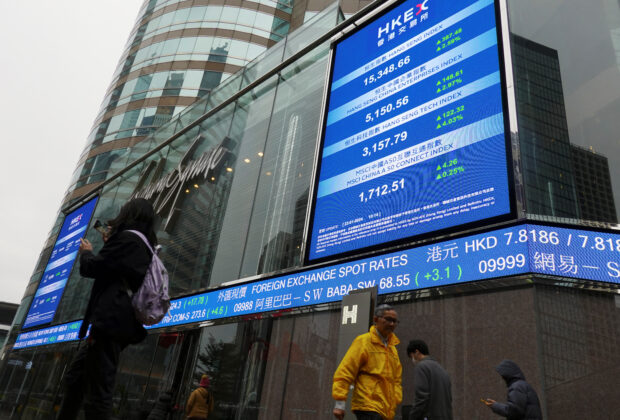Stocks eke out gains as investors focus on Fed

People walk past screens displaying the Hang Seng stock index and stock prices outside the Exchange Square in Hong Kong, China Jan 23, 2024. REUTERS/Joyce Zhou/File photo
LONDON/SINGAPORE – European shares eked out gains on Wednesday as investors waited for clues on when the U.S. Federal Reserve may start to cut interest rates, with the dollar heading for its biggest monthly gain since September.
The pan-European STOXX 600 index gained 0.3 percent, rising for the sixth straight session as financial services shares added 0.5 percent.
Spanish lender Santander rose 1.7 percent, after reporting a record-high profit for the last quarter of 2023, beating forecasts.
The MSCI world equity index, which tracks shares in 47 countries, added 0.1 percent.
U.S. Federal Reserve policymakers have signaled they will not yet cut interest rates, with economists predicting a delay until June given strength in household spending and uncertainty over the economic outlook.
Investors are therefore focused on any comments from Fed Chair Jerome Powell, including a potential further turn in his once-hawkish stance or hints on how soon the central bank could begin easing rates.
READ: With rate hikes likely done, Fed turns to timing of cuts
Interest rate futures price a roughly 43 percent chance of a Fed rate cut in March, down from 73 percent at the start of the year.
“We could see the central bank look to put a pin in the idea that a March rate cut is coming,” Michael Hewson, chief markets strategist at CMC Markets, said in a note.
Magnificent Seven stocks
Wall Street was set for losses, however.
Nasdaq futures fell 0.8 percent, while S&P 500 futures lost 0.3 percent ahead of earnings from major tech firms.
The outsized weighting of so-called Magnificent Seven stocks in the S&P 500 is under renewed focus from investors, even as their collective strength pushes U.S. equities to record highs.
READ: Can sizzling Magnificent Seven trade keep powering US stocks in 2024?
The dollar has gained 2.2 percent against a basket of major currencies this month, its best since September, as markets dialed back expectations on the speed and scale of rate cuts. It was last up 0.1 percent at 103.52.
Earlier, Chinese shares lost 0.9 percent after a survey showed manufacturing activity shrinking in January for a fourth month.
That dragged MSCI’s broadest index of Asia-Pacific shares outside Japan down 0.4 percent and it was heading for a monthly loss of roughly 5 percent, snapping a two-month winning streak.
The loss has in part been due to a steep selloff in Chinese stocks this month that prompted Beijing to step in to put a floor under its sliding market.
“There’s a patently clear sign in my mind (that) they don’t want the market to go down anymore,” Mark Matthews, Bank Julius Baer’s head of research for Asia, said at an outlook briefing in Singapore on Tuesday.
Asian markets
China’s blue-chip index, which earlier this month hit its lowest since 2019, lost 0.9 percent and is down roughly 6 percent for January, marking its sixth straight monthly decline – a record losing streak.
Other market moves were largely subdued as traders stayed on guard ahead of the Fed decision.
In Japan, though, the Nikkei ended the month with a more than 8 percent gain, its best January performance since 1998.
READ: Japan’s Nikkei hits 34-year peak above 36,000 as shippers rally
A summary of opinions from the country’s central bank’s January meeting showed policymakers looking at the likelihood of a near-term exit from negative interest rates and possible scenarios for phasing out the bank’s massive stimulus program.
JGB yields edged broadly higher in response, with the two-year JGB yield rising 2.5 basis points to 0.095 percent, its highest since Dec. 11.
The yen was steady at 147.48, and was headed for a monthly decline of 4.5 percent, heading for its largest monthly drop since June 2022.
Oil prices dipped after climbing in the previous session as tensions linger in the Middle East.
Brent futures slipped 16 cents to $82.67 a barrel. U.S. crude lost 11 cents to $77.71.